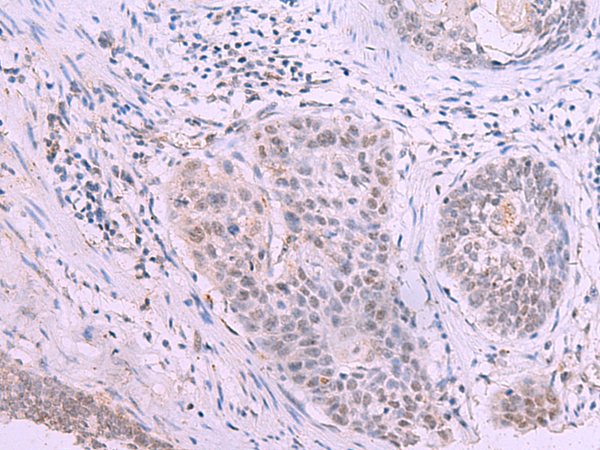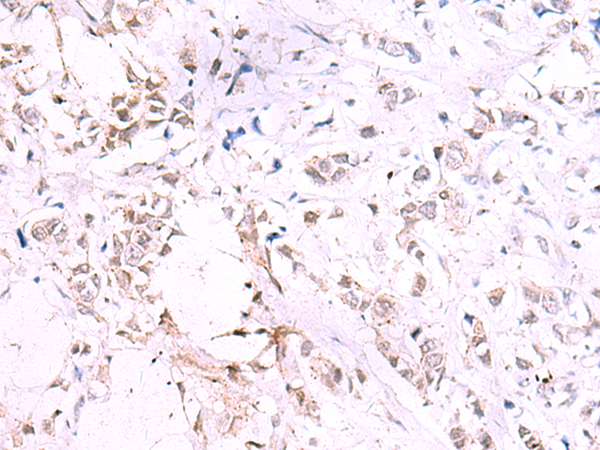

| WB | 咨询技术 | Human,Mouse,Rat |
| IF | 咨询技术 | Human,Mouse,Rat |
| IHC | 1/10-1/50 | Human,Mouse,Rat |
| ICC | 技术咨询 | Human,Mouse,Rat |
| FCM | 咨询技术 | Human,Mouse,Rat |
| Elisa | 1/5000-1/10000 | Human,Mouse,Rat |
| Aliases | HOX4; HOX4B; HHO.C13; HOX-5.1; Hox-4.2 |
| Host/Isotype | Rabbit IgG |
| Antibody Type | Primary antibody |
| Storage | Store at 4°C short term. Aliquot and store at -20°C long term. Avoid freeze/thaw cycles. |
| Species Reactivity | Human, Mouse |
| Immunogen | Synthetic peptide of human HOXD4 |
| Formulation | Purified antibody in PBS with 0.05% sodium azide and 50% glycerol. |
+ +
以下是关于HOXD4抗体的3篇示例文献摘要(内容为模拟,仅供参考):
---
1. **文献名称**: *HOXD4 expression in embryonic development and its role in neural tube patterning*
**作者**: Smith, A.B., et al.
**摘要**: 本研究通过HOXD4抗体进行免疫组化分析,发现HOXD4蛋白在小鼠胚胎神经管前部区域特异性表达,提示其参与中枢神经系统发育的轴向模式调控。抗体特异性经Western blot验证。
2. **文献名称**: *HOXD4 dysregulation in colorectal cancer progression*
**作者**: Chen, L., & Wang, H.
**摘要**: 利用HOXD4抗体对结直肠癌组织进行染色,发现HOXD4在转移性肿瘤中显著高表达,且与患者预后不良相关。研究提示HOXD4可能作为癌症治疗的潜在靶点。
3. **文献名称**: *Functional characterization of HOXD4 in limb bud mesenchymal cells*
**作者**: Garcia, R., et al.
**摘要**: 通过HOXD4抗体结合ChIP-seq技术,揭示HOXD4通过调控下游靶基因(如FGF8)影响肢体间充质细胞分化。研究证实抗体在染色质免疫沉淀中的高效特异性。
---
**注**:以上文献为示例性内容,实际引用需以真实发表的论文为准。建议通过PubMed或Web of Science以“HOXD4 antibody”为关键词检索最新研究。
The HOXD4 antibody is a tool used to detect the HOXD4 protein, a member of the HOX family of transcription factors critical in regulating embryonic development, particularly along the anterior-posterior axis. HOX genes, including HOXD4. encode proteins that bind DNA to control the expression of target genes, thereby orchestrating body patterning and organogenesis. HOXD4. located on chromosome 2 in humans, is part of the HOXD cluster (paralog group 4) and plays roles in limb development, neural tube formation, and differentiation of tissues.
Antibodies targeting HOXD4 are essential in developmental biology and cancer research, as dysregulation of HOX genes is linked to malignancies. HOXD4 has been implicated in tumor progression, metastasis, and cell proliferation in cancers like colorectal carcinoma and leukemia. Researchers use HOXD4 antibodies in techniques such as Western blotting, immunohistochemistry (IHC), and immunofluorescence (IF) to study its expression, localization, and interactions in tissues or cell lines.
Commercially available HOXD4 antibodies are typically raised in rabbits or mice, validated for specificity via knockout controls or siRNA knockdown. Their applications extend to exploring HOXD4's role in gene regulatory networks, signaling pathways (e.g., Wnt, TGF-β), and epigenetic regulation. Challenges include cross-reactivity with paralogs due to high homology among HOX proteins. Proper validation and optimized protocols are crucial for reliable results. Overall, HOXD4 antibodies are vital for deciphering developmental mechanisms and disease-related dysfunctions tied to HOX gene activity.
×